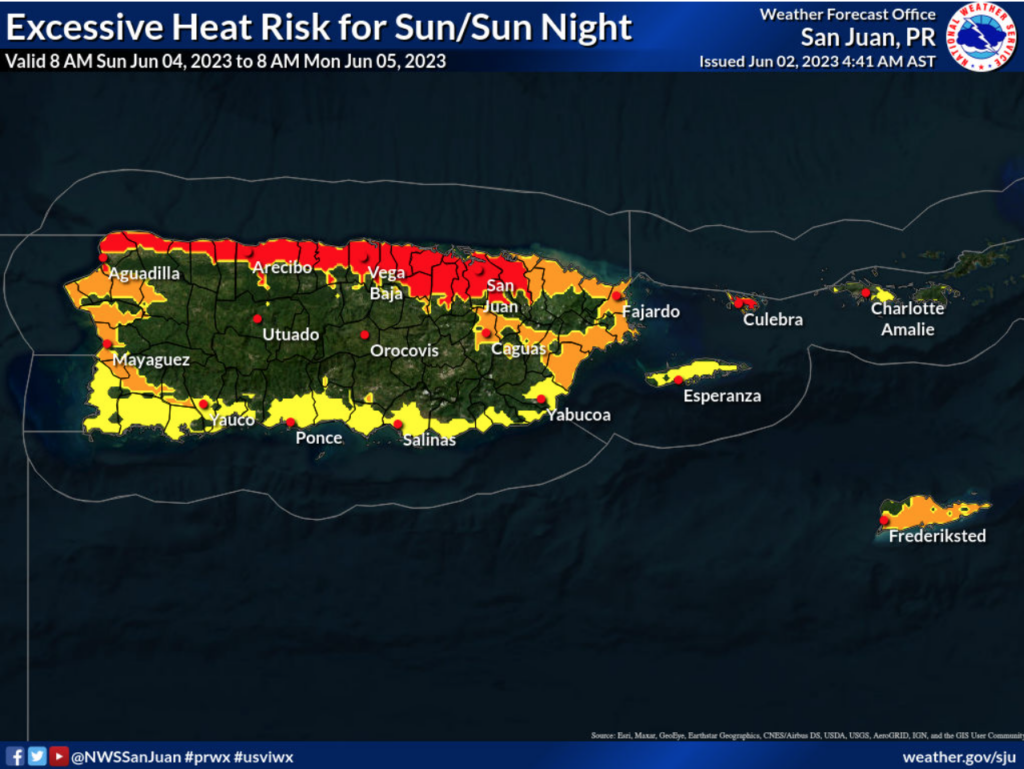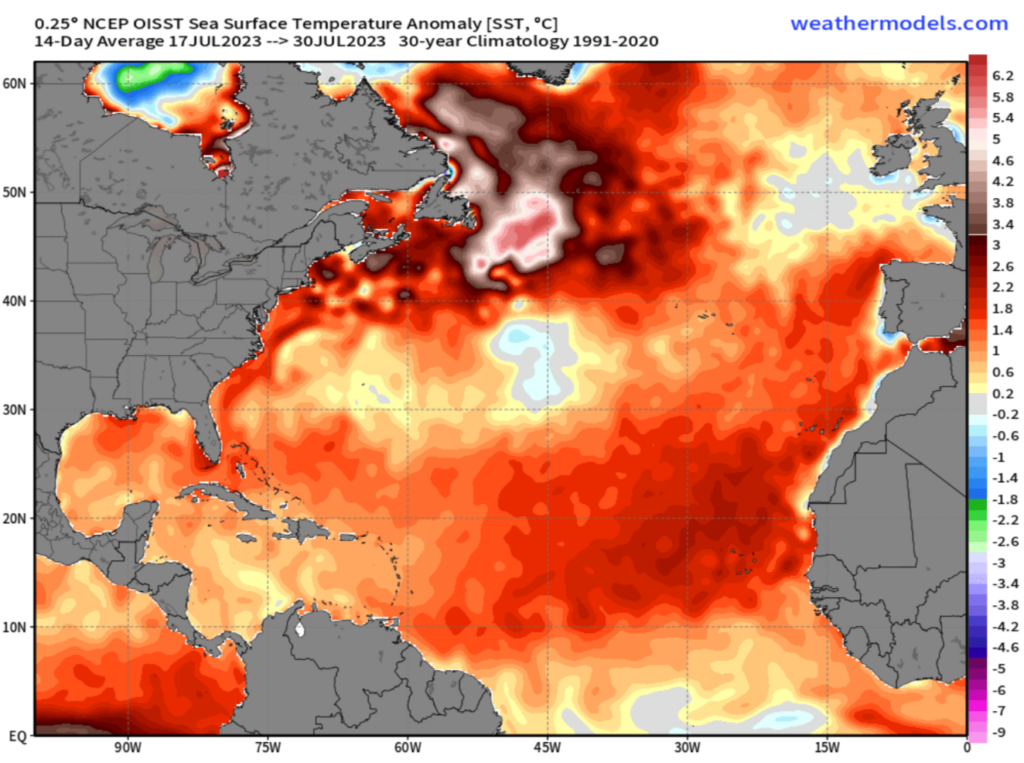The U.S. Virgin Islands and Puerto Rico experienced interesting and significant weather events throughout 2023. A preliminary report released by the National Weather Service (NWS) in San Juan, Puerto Rico, noted that several weather-related records, predominantly temperature records, were shattered across both territories.
The initial report from the NWS was released on Tuesday and highlighted weather events that impacted the local islands throughout the past year.
“This preliminary summary provides a glimpse into the various weather and marine events that affected Puerto Rico and the U.S. Virgin Islands in 2023,” the NWS report said. “This summary provides an initial overview of these events, encompassing elements ranging from historically excessive heat events to significant swell action,” the report continued.
Excessive Heat Across the Region
In the 2023 significant weather events report, abnormally high temperatures stood out. “Excessive Heat” across the USVI and Puerto Rico was referenced multiple times, and 2023 was one of the warmest years on record. The report noted that the elevated temperatures may have been influenced by an area of high pressure situated over the region between April and July.

“Temperatures were well above normal from April 30th to early July, mostly due to an anchored high pressure very close to the local islands,” according to the NWS.
Emanuel Rodriguez, a meteorologist with the NWS in San Juan, P.R., provided additional details about the high temperatures across the area to the Source.
“The first heat spell was indeed due to an unusually close high-pressure system over the area,” Rodriguez said. “This feature made the temperatures soar across the region. Then, we did not see much relief late in the summer, because the waters around the islands were just too hot, and the humidity was higher than normal. Heat indices were impressive almost every day,” he added.
Due to the high temperatures, many heat-related alerts were issued across the USVI and Puerto Rico during the year, including 67 “Excessive Heat Warnings” and 142 “Heat Advisories,” according to the NWS update.
USVI Weather Events
Heat-related weather events were striking across the USVI. Weather observations obtained at Henry E. Rohlsen Airport on St. Croix showed that the island registered its warmest year ever, with an average temperature of 82.6 degrees Fahrenheit.
The NWS said St. Croix saw 20 days when the temperature reached 95 degrees Fahrenheit, smashing previous records. According to the NWS, 72 records for “Maximum Daily Temperature” and 31 for “Warmest Daily Minimum Temperature” were broken across St. Croix.
The island recorded its warmest months as August, September, October, and November, with September being St. Croix’s “warmest month overall since records began in 1898,” according to the report. (December was also the warmest on record when the report was issued.)
St. Thomas was baking throughout the year as well. Weather observations collected at Cyril E. King Airport showed 2023 as the island’s fifth warmest year on record, with an average temperature of 82.3 degrees Fahrenheit. St. Thomas saw a record-setting 127 days during which the minimum daily temperature was above 80 degrees Fahrenheit.
Rodriguez noted that one of the reasons for the temperature differences between St. Croix and St. Thomas may have to do with the location of the thermometers. The St. Thomas sensor is positioned closer to the ocean.
In addition to the abnormally high heat, the Virgin Islands encountered other noteworthy weather phenomena, including an early April hailstorm in St. Croix.
“A very rare hail event was observed in East End, St. Croix, with some cars experiencing dents from the ice pellets,” the NWS report said.
The USVI sustained drought conditions for most of the year. However, drought conditions improved across the territory, particularly during October, when substantial rainfall helped alleviate dry conditions. For example, St. John, which received much-needed rainfall and recorded 6-8 inches of rain in 24 hours between Oct. 3 and 4, was drought-free by late October.
Puerto Rico Weather Events
Puerto Rico was also roasting in 2023, and the island finished out the year as its third warmest year on record, with an average temperature of 82.2 degrees Fahrenheit.
The island “broke 28 ‘Maximum Daily Temperature’ records and 65 ‘Warmest Daily Minimum’ records,” according to the NWS.
Puerto Rico experienced its warmest August, September, October, and November on record, with September ending as the “warmest month overall since records began in 1898,” the report explained.
Like the Virgin Islands, Puerto Rico endured drought conditions during the year. However, conditions improved slightly during October when heavy rains drenched parts of the island.
The NWS also provided information about three small tornadoes that touched down across Puerto Rico in 2023, which occurred in March, July, and August. The storms damaged several structures.
Hurricane Season 2023
Fortunately, the USVI and Puerto Rico avoided a direct hit from cyclones during the 2023 Atlantic Hurricane Season. Still, indirect impacts were felt across both territories. Many cyclones formed in the Atlantic Basin despite an ongoing El Nino weather pattern, which typically helps suppress cyclonic development.

“The Atlantic Basin saw 23 tropical depressions and 20 named storms in 2023, ranking 4th for most named storms in a season since 1950,” the NWS said.
“Although Puerto Rico and the USVI did not receive a direct impact from a tropical cyclone this season, several systems affected the islands indirectly in the form of swells and/or external/feeder bands,” the NWS report continued.
Exceptionally Warm Ocean Water Temperatures
Ocean water temperatures were extremely warm most of the year in 2023.
“All CariCOOS nearshore wave buoys [a coastal observation network] in the Atlantic, Caribbean, and near the northern U.S. Virgin Islands reported above-normal sea surface temperatures from April through November, corresponding to the period where we measured well above normal air temperatures,” according to the NWS report.
“The cause for the elevated temperatures in the water was due to the ongoing marine heat wave,” meteorologist Rodriguez explained to the Source.
“Marine heat waves,” which scientists are closely studying, are defined as “periods of persistent anomalously warm ocean temperatures, which can have significant impacts on marine life as well as coastal communities and economies,” according to the National Oceanic and Atmospheric Administration.
Finally, ocean swell events throughout the year were primarily influenced by hurricanes passing the islands and strong trade winds, creating choppy seas. For example, Hurricane Lee, a major Category 4 hurricane, created high surf across the northern coasts of the local islands in September. More recently, northerly swells combined with gusty winds created hazardous seas in December.

A final end-of-year weather report from the NWS in San Juan, Puerto Rico, is expected to be available in January. USVI visitors and residents are encouraged to follow the National Weather Service for the latest weather alerts. The Virgin Islands Territorial Emergency Management Agency and the National Weather Service also provide information about severe weather.
Weather updates and a Weekly Weather Video are available on the Source Weather Page.





